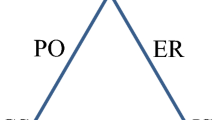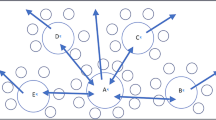Abstract
This paper describes an empirical study examining action research papers submitted by a group (n = 81) of out-of-field mathematics teachers as part of a professional development programme in Ireland. Utilising document analysis, the papers were qualitatively analysed for evidence of teachers’ beliefs and practices with respect to the teaching and learning of mathematics. In particular, demonstration of direct transmission and constructivist beliefs and practices was explored. The authors draw on Valsiner’s zone theory in conceptualising the ‘teacher-as-learner’ in this out-of-field context and it provided a means for analysing teachers’ development in terms of their beliefs and practices. Findings indicate a prevalence of direct transmission or traditional teaching practices prior to the out-of-field teachers’ action research, with some inconsistency with professed constructivist beliefs. There was evidence of a majority shift towards constructivist beliefs and practices post action research for a myriad of reasons, including increased pedagogical confidence in mathematics and the successful experience of constructivist approaches. Findings also highlight the role of reflective self-study in facilitating the creation of productive tensions, as well as the importance of the teachers’ interpretation of their zone of free movement in resolving complex issues and enabling out-of-field teachers’ development of constructivist beliefs and practices.
Similar content being viewed by others
Notes
The Teaching Council is the professional standards body for the teaching profession in Ireland. All teachers must register with them in order to teach in a school in Ireland. Similarly, all teacher education programmes undergo accreditation and review processes.
Each module runs for 6 weeks in a given semester. 2 modules are offered in Semester 1 (Sept.–Dec.) and 3 modules in Semester 2 (Jan.–May).
Level 8 on the National Qualifications Framework equates to undergraduate third level education.
References
Aelterman, N., Vansteenkiste, M., Van Keer, H., & Haerens, L. (2016). Changing teachers’ beliefs about autonomy support and structure: The role of experienced psychological need satisfaction in teacher training. Psychology of Sport and Exercise, 23, 64–72.
Beswick, K. (2004). The impact of teachers’ perceptions of student characteristics on the enactment of their beliefs. In M. J. Hoines & A. J. Fuglestad (Eds.), Proceedings of the 28th annual conference of the International Group for the Psychology of Mathematics Education (Vol. 2, pp. 111–118). Bergen, Norway: Bergen University College.
Blanton, M., Westbrook, S., & Carter, G. (2005). Using Valsiner’s zone theory to interpret teaching practices in mathematics and science classrooms. Journal of Mathematics Teacher Education, 8(1), 5–33.
Bosse, M. (2014). The practice of out-of-field teaching in mathematics classrooms. In L. Hobbs & G. Törner (Eds.), Taking an international perspective on ‘out-of-field’ teaching: Proceedings and agenda for research and action, 1st Teaching Across Specialisations (TAS) Collective Symposium (pp. 33–34). Porto, Portugal: TAS Collective.
Bowen, G. A. (2009). Document analysis as a qualitative research method. Qualitative Research Journal, 9(2), 27–40.
Corbin, J., & Strauss, A. (2008). Basics of qualitative research: Techniques and procedures for developing grounded theory (3rd ed.). Thousand Oaks, CA: Sage.
Darling-Hammond, L. & Post, L. (2000). Inequality in teaching and schooling: Supporting high quality teaching and leadership in low income schools. In R. D. Kahlenberg (Ed.), A nation at risk: Preserving public education as an engine for social mobility (pp. 127–167). New York, NY: The Century Foundation Press.
De Vries, S., Van De Grift, W., & Jansen, E. (2014). How teachers’ beliefs about learning and teaching relate to their continuing professional development. Teachers & Teaching, 20(3), 338–357.
Department of Education and Skills (2010). Report of the project Maths implementation support group. Dublin, Ireland: Department of Education and Skills.
Du Plessis, A. (2014). Out-of-field teaching practices as an unresolved global concern influencing teacher quality and effective classroom pedagogies. In L. Hobbs & G. Törner (Eds), Taking an international perspective on ‘out-of-field’ teaching: Proceedings and agenda for research and action from the 1st Teaching Across Specialisations (TAS) Collective Symposium (pp. 27–29). Porto, Portugal: TAS Collective. Retrieved from https://www.uni-due.de/TAS.
Du Plessis, A., Gillies, R. M., & Carroll, A. (2015). Understanding the lived experiences of novice out-of-field teachers in relation to school leadership practices. Asia-Pacific Journal of Teacher Education, 43(1), 4–21.
Ernest, P. (1989). The impact of beliefs on the teaching of mathematics. In P. Ernest (Ed.), Mathematics teaching: The state of the art (pp. 249–254). London, England: Falmer Press.
Galbraith, P. L., & Goos, M. (2003). From description to analysis in technology aided teaching and learning: A contribution form Zone Theory. In L. Bragg, C. Campbell, G. Herbert & J. Mousley (Eds.), Mathematics education research: Innovation, networking, opportunity: Proceedings of the Twenty-sixth Conference of the Mathematics Education Research Group of Australia (Vol. 1, pp. 364–371). Geelong, Australia: Deakin University.
Gibbs, G. R. (2007). Analysing qualitative data. London, England: SAGE Publications Ltd.
Goos, M. (2013). Sociocultural perspectives in research on and with mathematics teachers: A zone theory approach. ZDM Mathematics Education, 45(4), 521–533.
Goos, M., & Geiger, V. (2010). Theoretical perspectives on mathematics teacher change. Journal of Mathematics Teacher Education, 13(6), 499–507.
Guskey, T. R. (2002). Professional development and teacher change. Teachers and Teaching: Theory and Practice, 8(3/4), 381–391.
Hobbs, L. (2013). Teaching out-of-field as a boundary-crossing event: Factors shaping teacher identity. International Journal of Science and Mathematics Education, 11(2), 271–297.
Hobbs, L. & Porsch, R. (2019). Introduction. In L. Hobbs & G. Törner (Eds.), Examining the phenomenon of “teaching out-of-field”: International perspectives on teaching as a non-specialist (pp. 12–15). Dordrecht, The Netherlands: Springer.
Hobbs, L. & Törner, G. (Eds.). (2019). Examining the phenomenon of “teaching out-of-field”: International perspectives on teaching as a non-specialist. Dordrecht, The Netherlands: Springer.
Ingersoll, R. M. (2002). Out-of-field teaching, educational inequality and the organisation of schools: An exploratory analysis. Seattle, WA: University of Washington: Center for the Study of Teaching and Policy.
Jaworski, B. (1998). Mathematics teacher research: Process, practice and the development of teaching. Journal of Mathematics Teacher Education, 1(3), 3–31.
Kippendorff, K. (2004). Content analysis: An introduction to its methodology. Thousand Oaks, CA: Sage.
Kunter, M., Kleickmann, T., Klusmann, U., & Richter, D. (2013). Professional competence of teachers: Effects on instructional quality and student development. Journal of Educational Psychology, 105(3), 805–820.
McNiff, J. (2010). Action research for professional development: Concise advice for new and experienced action researchers. Poole, Dorset: September Books.
Miles, M., & Huberman, A. (1994). Qualitative data analysis. Thousand Oaks, CA: Sage.
Ní Ríordáin, M. & Hannigan, A. (2011). Who teaches our students mathematics at post-primary education in Ireland? Irish Educational Studies, 30(3), 289–304.
Ní Ríordáin, M., Paolucci, C. & O’Dwyer, L. M. (2017). An examination of the professional development needs of out-of-field mathematics teachers. Teaching and Teacher Education, 64, 162–174.
Noffke, S. E. (2009). Revisiting the professional, personal, and political dimensions of action research. In S. E. Noffke & B. Somekh (Eds.), The sage handbook of educational action research (pp. 5–18). London, England: Sage.
Organization for Economic Cooperation and Development [OECD] (2014). PISA 2012 results in focus: What 15-year-olds know and what they can do with what they know. Available at http://www.oecd.org/pisa/keyfindings/pisa-2012-results-overview.pdf.
Pajares, F. (1992). Teachers’ beliefs and educational research: Cleaning up a messy construct. Review of Educational Research, 62(3), 307–332.
Roche, M. (2011). Creating a dialogical and critical classroom: Reflection and action to improve practice. Educational Action Research, 19(3), 327–343.
Ross, J. A., Cousins, J. B., Gadalla, T. & Hannay, L. (1999). Administrative assignment of teachers in restructuring secondary schools: The effect of out-of-field course responsibility on teacher efficacy. Educational Administration Quarterly, 35(5), 782–805.
Silverman, D. (2017). Doing qualitative research (5th ed.). London, England: SAGE Publications Ltd.
Teaching Council (2011). Initial teacher education: Criteria and guidelines for Programme providers. Available at http://www.teachingcouncil.ie/_fileupload/Teacher%20Education/ITE%20Criteria%20and%20Guidelines%20Final%20July%202011.pdf.
Thompson, A. G. (1992). Teachers’ beliefs and conceptions: A synthesis of the research. In D. A. Grouws (Ed.), Handbook of research on mathematics teaching and learning (pp. 127–146). New York, NY: Macmillan.
Valsiner, J. (1997). Culture and the development of children’s action: A theory of human development (2nd ed.). New York, NY: Wiley.
Vygotsky, L. (1978). Mind in society. Cambridge, MA: Harvard University Press.
Wild, P. J., McMahon, C., Darlington, M., Liu, S., & Culley, S. (2009). A diary study of information needs and document usage in the engineering domain. Design Studies, 31(1), 46–73.
Zhang, Q., & Morselli, F. (2016). Teacher Beliefs. In G. Kaiser (Ed.), Attitudes, beliefs, motivation and identity in mathematics education: An overview of the field and future directions (pp. 11–14). Basel, Switzerland: Springer International Publishing.
Author information
Authors and Affiliations
Corresponding author
Ethics declarations
Ethical approval was granted for a large-scale research project underpinning the PDMT, of which examining the action research component was part of the overall project. Consent was gained from participants on commencement of their studies.
Rights and permissions
About this article
Cite this article
Lane, C., Ní Ríordáin, M. Out-of-Field Mathematics Teachers’ Beliefs and Practices: an Examination of Change and Tensions Using Zone Theory. Int J of Sci and Math Educ 18, 337–355 (2020). https://doi.org/10.1007/s10763-019-09964-5
Received:
Accepted:
Published:
Issue Date:
DOI: https://doi.org/10.1007/s10763-019-09964-5




